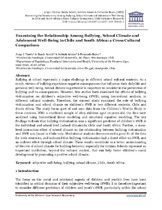Examining the relationship among bullying, school climate and adolescent well-being in Chile and South Africa: a cross cultural comparison
Date
2019Author
Varela, Jorge J.
Savahl, Shazly
Adams, Sabirah
Reyes, Fernando
Metadata
Show full item recordAbstract
Bullying at school represents a major challenge in different school cultural contexts. As a result, victims of bullying experience negative consequences that influence their daily life and personal well-being. School climate in particular is important to consider in the prevention of bullying and its consequences. However, few studies have examined the effects of bullying victimization on children’s subjective well-being (SWB), using hierarchical analysis, in different cultural contexts. Therefore, the current study examined the role of bullying victimization and school climate on children’s SWB in two different contexts, Chile and South Africa. The study forms part of and uses data from the Children’s Worlds Study in these contexts. With a combined sample of 1829 children aged 12-years old, the data were analyzed using hierarchical linear modeling and structural equation modeling. The key findings indicate that bullying victimization was a significant predictor of children’s SWB at the individual and school level (school climate) in Chile and South Africa. Further, a cross-level interaction effect of school climate on the relationship between bullying victimization and SWB was found in Chile only. Mediational analysis demonstrated a good fit of the data for both countries, and indicated that bullying victimization had a direct effect on SWB, and an indirect effect through school climate. These results contribute to a better understanding of the role of school climate for bullying behavior, especially for victims. Schools represent an important institution, beyond the cultural context, that can help foster children’s social development by promoting a positive school climate.

